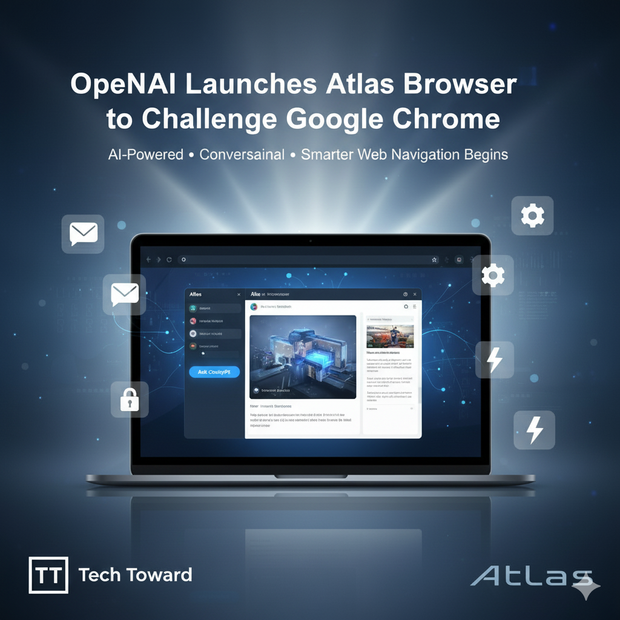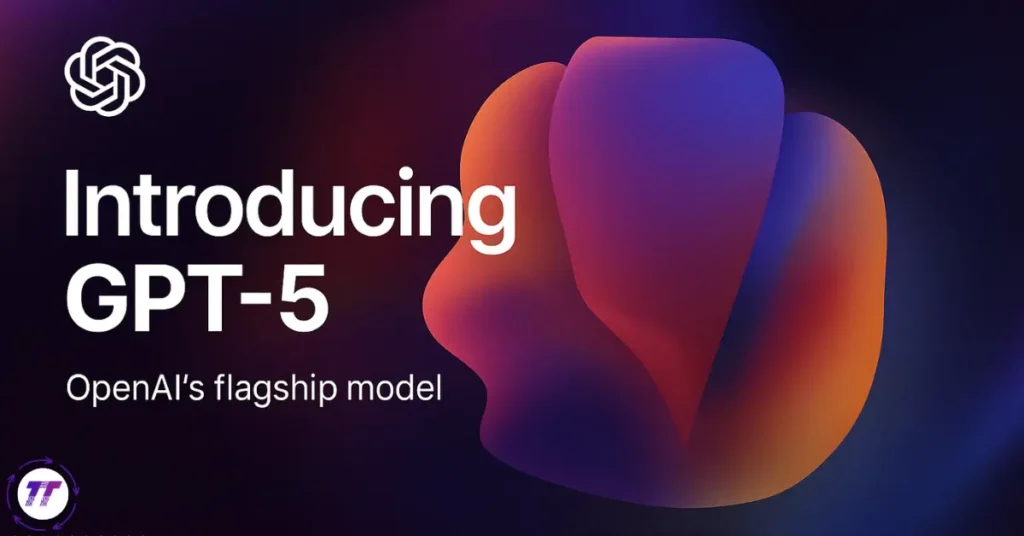The web browser landscape, long dominated by Google Chrome, is facing a major shake-up. OpenAI has officially announced Atlas, a next-generation browser that reimagines how we interact with the internet. With deep integration of artificial intelligence, Atlas aims to make browsing smarter, faster, and far more intuitive—ushering in what could be the biggest browser revolution since Chrome itself.
What Is OpenAI Atlas?
OpenAI’s Atlas isn’t just another browser with AI sprinkled in—it’s a ground-up reinvention of web navigation. By embedding ChatGPT directly into the browser, Atlas transforms every browsing session into a conversational, context-aware experience. Whether summarizing long articles, comparing products, or automating tasks, Atlas brings the power of ChatGPT to every webpage.
Built on Chromium for Seamless Compatibility
Atlas is based on Chromium, the same open-source engine that powers Chrome and Microsoft Edge. This means full compatibility with modern websites and Chrome extensions, and easy migration of bookmarks, passwords, and browsing history. OpenAI’s decision to use Chromium allows it to focus entirely on innovation in AI integration rather than rebuilding core browsing infrastructure.
Why OpenAI Is Taking On Chrome
Rethinking the Browser
Chrome revolutionized browsing when it launched in 2008, but innovation has since slowed. Sam Altman, OpenAI’s CEO, described AI as a “once-a-decade opportunity to rethink what a browser can be.” Atlas is built on that vision—to transform the browser from a passive tool into an active assistant.
Timing the Shift
The launch comes at a pivotal moment. Studies show users increasingly turn to AI-generated summaries instead of traditional search results. As information consumption shifts toward synthesized answers, a browser with integrated AI offers exactly what users are starting to expect. OpenAI sees Atlas as the bridge to that future.
Moreover, as AI systems like ChatGPT become more advanced (see this detailed breakdown of ChatGPT‑5 and its usage limits) you can better understand how Atlas fits into the bigger picture of AI-powered browsing.
What Sets Atlas Apart
1. ChatGPT Integration Everywhere
Every page in Atlas features an “Ask ChatGPT” button that opens a sidebar with ChatGPT ready to assist. No more copy-pasting between tabs—ChatGPT can summarize, explain, or analyze whatever’s on your screen.
Use cases include:
- Summarizing dense reports or news articles
- Comparing products across multiple sites
- Explaining technical jargon instantly
- Analyzing tables, data, or research findings
This persistent AI companion turns browsing into a seamless dialogue.
2. Agent Mode: Hands-Free Task Automation
Perhaps Atlas’s most futuristic feature, Agent Mode, lets ChatGPT autonomously perform tasks online. In demos, ChatGPT found a recipe and ordered ingredients via Instacart—end-to-end. Users could soon ask it to “book me a flight under $800” and watch it search, compare, and check out autonomously.
Users remain in control with “Take Control” and “Stop” buttons that allow intervention anytime. Agent Mode is available to ChatGPT Plus and Pro subscribers.
3. Memory and Personalization
Atlas introduces a “memories” feature that allows the browser to learn from your behavior—remembering preferences, interests, and context to provide increasingly relevant recommendations. Like a true assistant, it evolves with your habits.
4. Privacy-First Architecture
Privacy is central to Atlas’s design. Users can choose between linked and incognito browsing, and OpenAI promises that browsing data won’t be used for model training unless users opt in. Business accounts are excluded entirely from training data collection. In an era of growing privacy fears, this transparency is crucial.
Getting Started with Atlas
Availability and Platforms
Atlas launches first for macOS, with Windows, iOS, and Android versions coming soon. All users get free access to ChatGPT integration, while Agent Mode and advanced automation require a paid ChatGPT plan.
Easy Migration
Migrating from other browsers takes minutes:
- Download Atlas
- Select your current browser (Chrome, Safari, Firefox)
- Choose what to import (bookmarks, passwords, history)
- Authenticate and start browsing
Because Atlas runs on Chromium, everything from Chrome extensions to saved passwords works seamlessly.
Launch Incentive
To encourage adoption, OpenAI is offering all users—free and paid—a 7-day boost to their ChatGPT data limits for making Atlas their default browser.
Why Atlas Matters
Challenging Google’s Dominance
Google Chrome currently commands around three billion users and over 70% market share. Following Atlas’s announcement, Alphabet’s stock dipped 1.8%, reflecting the market’s awareness of a real competitive threat.
If users start relying on AI-driven summaries within Atlas rather than visiting websites via Google Search, it could disrupt the web’s advertising and discovery ecosystem—an area generating hundreds of billions annually.
Browsers as the New AI Battleground
OpenAI isn’t alone in targeting AI-first browsing. Perplexity’s Comet, Microsoft’s Edge Copilot, and Google’s own experiments with Gemini all point to a shift in focus: the browser as the new frontier for AI. Whoever controls this gateway will influence how billions of people access and interact with online information.
Rethinking Search and URLs
Altman predicts that conversational interfaces could one day replace the URL bar itself. Instead of typing addresses or keywords, users might simply say, “Find me the best running shoes under $100,” and receive tailored results—no search links required.
In his words: “Tabs were great, but we haven’t seen real browser innovation since then.” Atlas aims to change that.
Potential Challenges Ahead
Privacy and Security Concerns
Even with OpenAI’s privacy assurances, integrating AI deeply into a browser introduces risks. Autonomous browsing through Agent Mode raises valid questions: what happens to sensitive data, passwords, or payment information during automation? OpenAI insists users remain in control, but scrutiny is inevitable.
Accuracy and Hallucinations
ChatGPT’s tendency to hallucinate—confidently presenting false information—remains a challenge. As Atlas becomes a source of synthesized knowledge, users must remain critical of AI-provided summaries, especially for factual or research-heavy tasks.
Impact on Websites and SEO
If users stop clicking links in favor of AI-generated summaries, website traffic, ad revenue, and SEO strategies could face massive disruption. Publishers may need to adapt to new visibility standards within AI-driven ecosystems.
Overcoming Chrome’s Entrenchment
Analysts like Forrester’s Paddy Harrington caution that even a superior product faces an uphill climb against Chrome’s immense market share and deep integration with Google’s ecosystem. Chrome’s default presence on Android and tie-ins with Gmail, Docs, and Search give it formidable staying power.
Real-World Use Cases
Students and Researchers
Atlas can instantly summarize academic papers, compare theories, generate outlines, and locate credible citations—all without manually opening dozens of tabs. This makes research more efficient and structured.
Online Shoppers
Atlas simplifies e-commerce with product comparisons, unbiased review summaries, price tracking, and automated checkout assistance—making it a one-stop shopping companion.
Professionals and Entrepreneurs
From automating repetitive tasks to analyzing competitors or drafting emails, Atlas streamlines workflow. With Agent Mode, tasks like scheduling or form-filling can be delegated entirely.
Everyday Browsing
Atlas enhances casual browsing too—whether simplifying recipes, planning trips, or translating articles into plain language. It personalizes and clarifies the internet experience.
Expert and Industry Reactions
Analysts view Atlas as more than a browsing tool—it’s a potential ad platform in disguise. Gil Luria of D.A. Davidson suggests integrating chat functions could let OpenAI eventually monetize via contextual advertising, challenging Google’s ad model head-on.
Others see Atlas as a stress test for the public’s readiness to embrace AI-first computing. If users adopt it widely, it could signal the dawn of an AI-centric internet, where assistants—not search engines—mediate online interaction.
FAQs: Key Questions About Atlas
What is Atlas?
An AI-powered browser by OpenAI that integrates ChatGPT for real-time assistance, summarization, and task automation directly within webpages.
Is it free?
Yes, with optional paid features like Agent Mode for ChatGPT Plus and Pro users.
Which devices are supported?
Atlas is currently on macOS, with Windows, iOS, and Android versions in development.
Can I import my Chrome data?
Yes—bookmarks, passwords, and extensions import easily.
Is it safe?
By default, browsing data isn’t used for AI training. Incognito sessions remain private and unlinked from your ChatGPT account.
Does it work with Chrome extensions?
Mostly yes, since it’s Chromium-based, though some extensions may need updates.
What is Agent Mode?
An autonomous browsing feature that allows ChatGPT to perform tasks like booking trips or placing orders, with manual override controls.
Will Atlas replace search engines?
Not entirely, but it introduces an alternative—AI-assisted conversational queries instead of keyword searches.
Should You Switch to Atlas?
Try It If You’re:
- An AI enthusiast or frequent ChatGPT user seeking seamless integration
- A researcher or professional needing faster, smarter web synthesis
- A Mac user curious about the future of AI-driven browsing
The transition from Chrome is nearly effortless, and the AI-enhanced workflow can save significant time.
Wait If You’re:
- A Windows or mobile user (until those versions launch)
- Highly privacy-conscious and prefer more independent security reviews
- Deeply tied to Google’s ecosystem for productivity apps
The Bigger Picture: The Future of Browsing
For over 15 years, browsers have changed little—tabs, address bars, and bookmarks still define the experience. Atlas challenges that status quo, positioning the browser as an intelligent, proactive companion rather than a passive window to the web.
As automation and AI agents increasingly navigate the internet, browsers like Atlas represent the next logical step. Whether it dethrones Chrome or not, OpenAI has pushed the industry forward. Even if Atlas doesn’t become dominant, it’s already succeeded in sparking competition—and with it, a new wave of browser innovation.
Conclusion: The Future Starts with Atlas
The atlas browser may well mark the dawn of an AI-first web experience. It merges the familiar world of browsing with the intelligence of ChatGPT, promising a future where you don’t just browse the web—you converse with it.
For now, Atlas is available for free to macOS users, with more platforms coming soon. Whether you’re curious, cautious, or captivated, one thing is clear: the future of the internet will be shaped not by faster browsers, but by smarter ones.
Your move, Google.
Related reading
Check out our deep dive into the capabilities and constraints of ChatGPT-5 in the article “ChatGPT-5 and Its Chat Limits Explained”.


